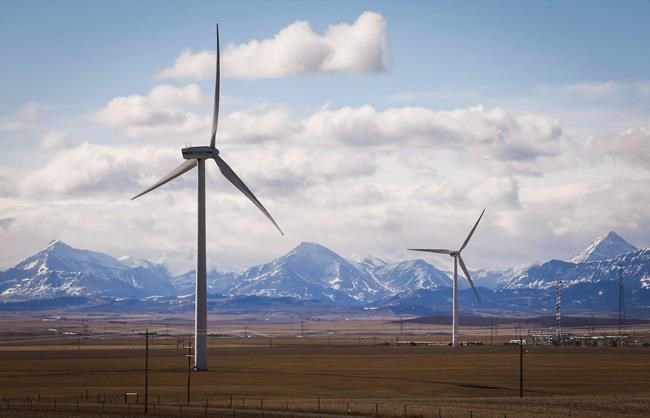CALGARY — One of Alberta's largest power generators says more than two-thirds of its profits will come from renewable electricity production by 2028 — a major transformation for a company that once was one of the largest emitters of greenhouse gases in the country.
TransAlta Corp. announced an updated capital growth plan at its investor day on Tuesday which will see the company invest $3.5 billion, focused mainly on clean electricity generating and storage capacity by the end of 2028.
The Calgary-based company, which has brought online more than 800 megawatts of wind and solar power since 2021 alone, said it will add an additional 1,750 MW of clean power within the next five years.
Most of that new generation will be organic growth — developing wind and solar projects from scratch — though the company is also open to growth through mergers and acquisitions if the right opportunity comes along, said TransAlta CEO John Kousinioris in an interview.
"What's interesting about it is just the impact it will have on our company," Kousinioris said of the new growth projections.
"It will end up pushing us pretty firmly into a more contracted and greener generation company. By 2028 and frankly, even earlier, somewhere in the range of 70 per cent of our EBITDA (earnings before interest, taxes, depreciation and amortization) will come from renewables."
Currently, approximately 40 per cent of TransAlta's EBITDA is attributable to renewable energy. The company is one of the largest producers of wind power in Canada, having grown its total renewable energy capacity from approximately 900 MW in 2000 to more than 2,900 MW in 2022.
But just a decade ago, the company's bread-and-butter was its large fleet of coal-fired power plants. TransAlta's move to convert those coal-fired plants to natural gas, at a cost of close to $300 million, was completed in late 2021 and has been widely hailed as a significant environmental accomplishment.
Shifting away from coal has reduced TransAlta's greenhouse gas emissions by 32 million tonnes annually — or 76 per cent — from what they were in 2005.
TransAlta is not turning its back on natural gas. The company recently announced a $658-million acquisition of Heartland Generation, a deal that adds 1,844 MW of gas-fired electricity production — mostly in Alberta — to the company's portfolio.
Kousinioris said natural gas-fired plants that can serve as a backup to renewables during periods of peak demand will still be necessary going forward, adding the company is looking at a handful of opportunities to "round out" its natural gas fleet.
But renewables are the future, he said, adding the "overwhelming majority" of TransAlta's growth in the coming years will be in the clean electricity space.
"We think that governments, investors, people are going to want a greener grid over time. We believe that the cost of carbon is going to continue to increase over time," Kousinioris said.
"We think that demand for renewables and storage will continue to increase and there'll be, over time, more and more policy supports for renewables."
In recent months, higher interest rates, inflation, and supply chain issues have dogged renewable companies, taking some of the shine off the sector for investors. The S&P/TSX renewable energy and clean technology index, for example, is down nearly 23 per cent from the start of the year.
There is also growing global debate over the pace and cost of the energy transition. TransAlta's home province of Alberta, for example, is pushing back against Ottawa's proposed clean electricity regulations, saying a 2030 net-zero target for the sector is unachievable.
Alberta has also imposed a temporary moratorium on renewable energy development over concerns about impacts to agricultural land, system reliability and reclamation.
But Kousinioris said TransAlta remains bullish on the long-term outlook for renewable electricity.
"At the end of the day, it's all about our convictions. And when we think about our convictions, we don't look at any short-term turbulence," he said.
"We try to take a really long-term view."
This report by The 91‘≠¥¥ Press was first published Nov. 21, 2023.
Companies in this story: (TSX:TA)
Amanda Stephenson, The 91‘≠¥¥ Press
Note to readers: This is a corrected story. A previous version erroneously implied the $3.5B spend would be entirely on renewables.



